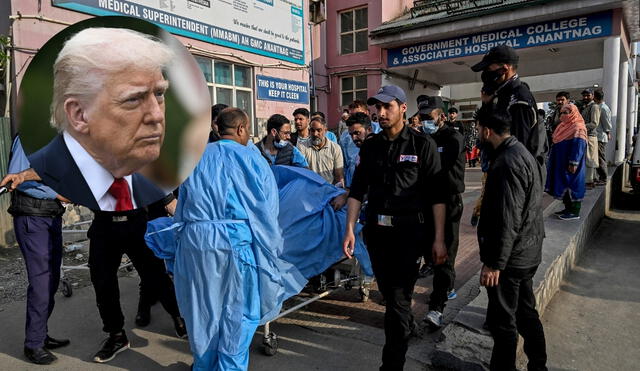Trump labels Kashmir Attack 'deeply disturbing,' pledges U.S. support for India
A deadly tourist attack in Kashmir sparks global outrage and raises urgent questions about security, peace, and the future of tourism in the region.

A terrorist attack in Pahalgam, Indian-administered Kashmir, resulted in the deaths of at least 26 tourists and injuries to over 36 others. Gunmen opened fire on visitors in the Baisaran meadow area, a popular tourist destination, marking a significant escalation in violence in the region. This incident is notable as tourists have rarely been targeted in the ongoing conflict. No group has claimed responsibility for the attack, and security forces are actively searching for the perpetrators. The assault has intensified concerns about the fragile security situation in Kashmir.
Indian authorities have condemned the attack, with Home Minister Amit Shah promising severe repercussions for those responsible. Prime Minister Narendra Modi cut short his trip to Saudi Arabia to address the situation, emphasizing the government's commitment to combating terrorism. Opposition leader Rahul Gandhi criticized the Modi administration for prematurely declaring normalcy in the region. Religious leader Mirwaiz Umar Farooq also condemned the violence, calling it un-Islamic and detrimental to Kashmir's hospitable image
Global leaders condemn Kashmir terror attack as questions rise over India’s security and tourism safety
International leaders have expressed their condolences and support for India. U.S. President Donald Trump described the attack as "deeply disturbing" and affirmed that the United States stands with India against terrorism. Vice President JD Vance, who was visiting India at the time, along with his wife Usha Vance, extended their sympathies to the victims. Other global leaders, including Russian President Vladimir Putin and Italian Prime Minister Giorgia Meloni, also condemned the attack and offered support.
The attack has raised questions about the effectiveness of India's security measures in Kashmir, especially following the revocation of the region's semi-autonomous status in 2019. While militant violence had decreased in recent years, this incident highlights the potential volatility in the area. The targeting of tourists, who have generally been spared in past conflicts, signifies a troubling shift in tactics by militants. The government's emphasis on promoting tourism as a sign of normalcy is now under scrutiny.

ALSO SEE: John Mulaney announces new standup tour 'Mister Whatever' — from the backseat of his kidnappers' car
Pahalgam attack highlights rising militancy in Kashmir and global calls for stronger counterterrorism efforts
The Pahalgam attack is one of the deadliest in the region in recent years, drawing parallels to past incidents of mass violence. It underscores the persistent challenges India faces in ensuring security in Kashmir. The incident has prompted calls for a reevaluation of current strategies to address militancy and protect civilians. The international community's response indicates a shared concern over the escalation of violence in the region.
As investigations continue, the focus remains on bringing the perpetrators to justice and preventing further attacks. The Indian government has reiterated its commitment to restoring peace and stability in Kashmir. Meanwhile, the global outpouring of support emphasizes the importance of international cooperation in combating terrorism. The Pahalgam attack serves as a stark reminder of the ongoing tensions and the need for sustained efforts to achieve lasting peace in the region.












